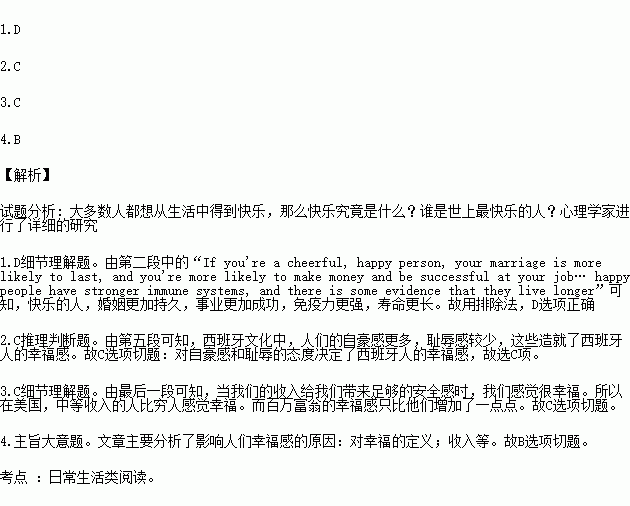题目内容
C
Ask most people anywhere in the world what they want out of life and the reply will probably be: “to be happy.” Ed Deiner, an American psychology professor, has spent his whole professional life studying what makes people happy, comparing levels of happiness between cultures and trying to find out exactly why we enjoy ourselves.
Many people would say that this question does not need an answer. But Professor Deiner has one anyway. “If you’re a cheerful, happy person, your marriage is more likely to last, and you’re more likely to make money and be successful at your job. On average, happy people have stronger immune systems, and there is some evidence that they live longer.”
So who are the world's happiest people? It depends on how the word is defined. There is individual happiness, the sense of joy we get when we do something we like. But there is also the feeling of satisfaction we get when we know that others respect us and approve of how we behave. According to Professor Deiner, the Western world pursues individual happiness while Asia prefers mutual (相互的,彼此) satisfaction.
“In the West, the individualistic culture means that your mood matters much more than it does in the East. People ask themselves if they are doing what is fun or interesting. They become unhappy when they can’t do any of these things. If you ask people from Japan or China if they are happy, they tend to look at what has gone wrong in their lives. If not much has gone wrong, then they are satisfied.”
People from Spain and other Spanish-speaking countries had the happiest culture, Professor Deiner found. “The biggest cultural difference is to do with pride and shame. Hispanic (西班牙语言的) cultures report much more pride and much less shame than others.”
Income also made a big difference to people’s happiness, but only at the lowest levels. Average income earners in the US were much happier than people in poverty. But millionaires were only a little bit happier than people on average incomes. It seems that money makes us happy when we have enough to feel secure.
1.According to the passage, happy people enjoy the following benefits except ______.
A. a long marriage B. profession success
C. better health D. respect from others
2.What can be inferred from the fifth paragraph?
A. Hispanic cultures lay stress on pride and shame.
B. Spanish people take too much pride in themselves.
C. Attitude towards pride and shame results in Spanish happiness.
D. If you are from Spain, you are the happiest.
3. In the last paragraph, the author seems to tell us ______.
A. Poor people enjoy the same happiness as millionaires
B. the higher income one gets, the happier life he lives
C. Enough money can make us feel safe and happy
D. Average income earners live the happiest life
4.The passage mainly discusses ______.
A. cultural differences in happiness
B. reasons for happiness
C. the happiest culture
D. benefits of happiness

